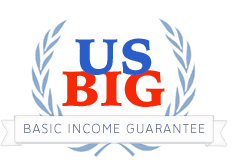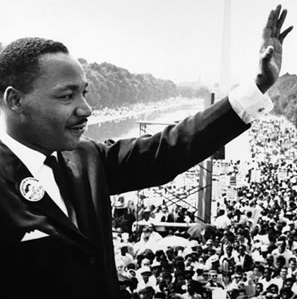The first Five years of the USBIG Network
By Karl Widerquist (2004)
The U.S. Basic Income Guarantee Network was founded in December of 1999. It is called the USBIG Network for short (pronounced “U.S. big”).
At that time, BIEN in Europe, CIT in Britain and several other organizations around the world had been discussing the basic income guarantee (BIG) for years, but there was no similar group in the United States. This absence was a little surprising because it was in the USA where the movement for a guaranteed income very nearly succeeded in the early 1970s. By the late 1990s, writers in many disciplines in the United States were again examining BIG, often with little contact with each other. In December 1999, Fred Block (University of California-Davis), Charley Clark (St. John’s University), Michael Lewis (State University of New York-Stony Brook), Pam Donavan (City University of New York-Graduate Center) and I created the USBIG Network over breakfast at the Kiev diner in New York City.
We chose the name because BIG works as a good generic term for “basic income,” “negative income tax,” and “guaranteed income.” Also, it makes a nice acronym and the domain name usbig.net was available. We began by contacting everyone we knew of in the United States and Canada who had written on the issue recently. That started us with a mailing list of only about 30 people. We took on only one goal: to increase discussion of the basic income guarantee in the United States.
Over the next 10 months, we organized a seminar series in New York, and I volunteered to write an email newsletter that would spread the word about the seminars, new publications on BIG, and any news I could find on the topic. Initially, I was surprised to find that there is always news about BIG happening somewhere in the world. Whether it’s a change in the Alaska Permanent Fund, a new bill in Brazil, a trial balloon in Canada, or a seminar in New Zealand, there’s always something.
Circulation grew quickly by word-of-mouth. In February 2002, with backing from the State University of New York at Stony Brook, the Citizen Policies Institute, and the City University of New York in Manhattan, we held our first Congress. More than 100 people from eight countries attended, including academics, activists, and students. One of the highlights was a retrospective on the negative income tax experiments of the 1970s.
A half dozen of the original researchers gathered to examine the relevance of those experiments for today’s movement. Several papers from the conference appeared as a journal symposium on the basic income guarantee in the Review of Social Economy (2004), and several more have been collected for a volume of essays entitled The Ethics and Economics of the Basic Income Guarantee. Michael Lewis, Steve Pressman, and Karl Widerquist (editors). Ashgate, (2004).
Our Second Congress was held in conjunction with the Eastern Economic Association in March of 2003. Several papers from that conference have been collected for a special issue in the Journal of Socio-Economics which will be out later this year. Our partnership with the .Eastern Economic Association has allowed us to count on having yearly congresses for the foreseeable future.
Following the Second Congress, we solidified the coordinating committee that runs USBIG. It includes Al Sheahen (publicity coordinator); Steve Shafarman (activist liaison); Michael Lewis (coordinator of the politics committee), Eri Noguchi (at large), Robert Harris (at large), and myself (coordinator).
Our Third Congress was held in Washington, DC, from February 20-22 2004. Philip Wogaman, a leader of the guaranteed income movement in the 1960s and 1970s, began the conference with a reflection on the development of the debate in the 35 years since the publication of his book, Guaranteed Annual Income: the Moral Issues. To him, the central objection to BIG asks, “Is it moral to give people things they haven’t earned?” He argues that we all receive things we haven’t earned, from childhood on. He points to the selectiveness of people who believe they earned everything they have, ignoring all the unearned advantages they have received.
Other highlights of the conference included a discussion of the possibility of an oil dividend for Iraq, and the first meeting between the fathers of the first two basic income guarantees in the world. Governor Jay Hammond created the Alaska Permanent Fund-the world’s first basic income guarantee-which since 1986 has distributed an oil dividend to every Alaska resident. Brazilian Senator Eduardo Suplicy sponsored the new law that will begin phasing-in the world’s first national basic income in Brazil in 2005. Although both had fought for BIG for decades, they had not met until now, and their meeting was an emotional moment for everyone present.
In addition to the Congresses and the Newsletter, USBIG maintains an on-line discussion paper series. Anyone is invited to submit a paper on the basic income guarantee or on the state of poverty and inequality. The discussion paper series now includes eighty-four papers that have been submitted over the last three years, and many of them have gone on to be published in major academic journals or in the popular press.
Over the last few years we have seen an increasing amount of discussion of BIG in academic and policy circles in the United States, and we feel we have had some success in our goal of increasing discussion of the issue in the United States, although it is still a long way from being a major part of the policy debate.



